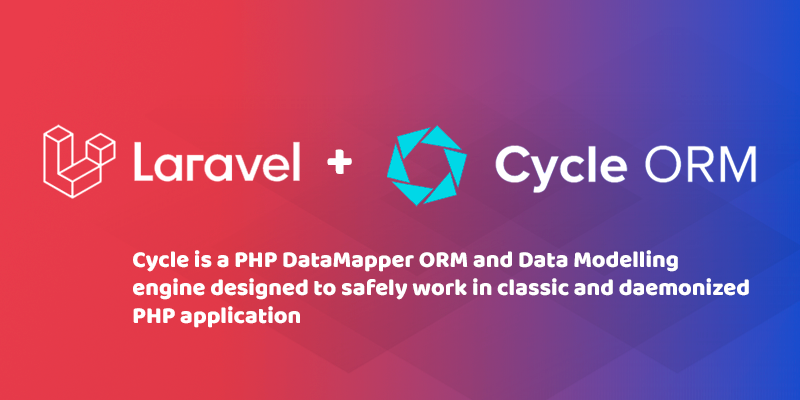Cycle is a PHP DataMapper ORM and Data Modelling engine designed to safely work in classic and daemonized PHP applications (like RoadRunner). The ORM provides flexible configuration options to model datasets, a powerful query builder, and supports dynamic mapping schemas. The engine can work with plain PHP objects, support annotation declarations, and proxies via extensions.
Full information - https://cycle-orm.dev/docs
- Laravel 7.x
- PHP 7.4 and above
From the command line run
composer require butschster/cycle-ormOptionally you can register the EntityManager, Transaction and/or ORM facade:
'DatabaseManager' => Butschster\Cycle\Facades\DatabaseManager::class,
'Transaction' => Butschster\Cycle\Facades\Transaction::class,
'ORM' => Butschster\Cycle\Facades\ORM::class,
'EntityManager' => Butschster\Cycle\Facades\EntityManager::class,DB_CONNECTION=postgres
DB_HOST=127.0.0.1
DB_PORT= # Default port 5432
DB_DATABASE=homestead
DB_USERNAME=root
DB_PASSWORD=
DB_MIGRATIONS_TABLE=migrations # Migrations table name
DB_SCHEMA_SYNC=false # Sync DB schema without migrations
DB_SCHEMA_CACHE=true # Cache DB schema
DB_SCHEMA_CACHE_DRIVER=file # DB schema cache driver
Publish the config file.
php artisan vendor:publish --provider="Butschster\Cycle\Providers\LaravelServiceProvider" --tag=configThe list of available connections and databases can be listed in the config/cycle.php - database section.
For more information see https://cycle-orm.dev/docs/basic-connect#configure-databases
DatabaseManager registered as a singleton container
$dbal = $this->app->get(\Spiral\Database\DatabaseManager::class);
// Or
$dbal = $this->app->get(\Spiral\Database\DatabaseProviderInterface::class);That's it!
Run cycle orm migrations from the directory.
Refresh database schema.
By default, class locator looks for entities in app folder. You can specify locations in config/cycle.php config file.
...
'directories' => [
app_path(),
],
...The EntityManager is the central access point to ORM functionality. It can be used to find, persist and remove entities.
You can use the facade, container or Dependency injection to access the EntityManager methods
EntityManager::persist($entity);
// Or
app(\Butschster\Cycle\Contracts\EntityManager::class)->persist($entity);
// Or
use Butschster\Cycle\Contracts\EntityManager;
class ExampleController extends Controller
{
protected $em;
public function __construct(EntityManager $em)
{
$this->em = $em;
}
}Entities are objects with identity. Their identity has a conceptual meaning inside your domain. In a CMS application each article has a unique id. You can uniquely identify each article by that id.
$article = EntityManager::findByPK('App\Article', 1);
$article->setTitle('Different title');
$article2 = EntityManager::findByPK('App\Article', 1);
if ($article === $article2) {
echo "Yes we are the same!";
}By passing the entity through the persist method of the EntityManager, that entity becomes MANAGED, which means that its persistence is from now on managed by an EntityManager.
$article = new Article;
$article->setTitle('Let\'s learn about persisting');
EntityManager::persist($article);An entity can be deleted from persistent storage by passing it to the delete($entity) method.
EntityManager::delete($article);<?php
namespace App;
use Illuminate\Contracts\Auth\Authenticatable;
/**
* @ORM\Entity(
* table="users",
* repository="App\UserRepository",
* )
*/
class User implements Authenticatable
{
/** @ORM\Column(type="uuid", primary=true) */
protected string $id;
/** @ORM\Column(type="string") */
protected string $password;
/** @ORM\Column(type="string") */
protected string $rememberToken = '';
public function getId(): string
{
return $this->id;
}
/**
* @return string
*/
public function getAuthIdentifierName(): string
{
return 'id';
}
/**
* @return string
*/
public function getAuthIdentifier(): string
{
return $this->getId();
}
/**
* @return string
*/
public function getAuthPassword(): string
{
return $this->password;
}
/**
* @param string $password
*/
public function setAuthPassword(string $password): void
{
$this->password = $password;
}
/**
* @return string
*/
public function getRememberToken(): string
{
return $this->rememberToken;
}
/**
* @param string $value
*/
public function setRememberToken($value): void
{
$this->rememberToken = $value;
}
/**
* @return string
*/
public function getRememberTokenName(): string
{
return 'rememberToken';
}
}namespace App;
use Butschster\Cycle\Repository;
class UserRepository extends Repository
{
/** @inheritDoc */
public function findByUsername(string $username): ?User
{
return $this->findOne(['username' => $username]);
}
}use Cycle\ORM\ORMInterface;
use Butschster\Cycle\Facades\ORM;
use Butschster\Cycle\Facades\EntityManager;
$user = new User();
$repository = app(ORMInterface::class)->getRepository($user);
// or
$repository = ORM::getRepository($user);
// or
$repository = ORM::getRepository(User::class);
$repository->persist($user);
// or
EntityManager::persist($user);use Butschster\Cycle\Facades\ORM;
use Butschster\Cycle\Facades\EntityManager;
$repository = ORM::getRepository(User::class);
$user = $repository->findByPK('5c9e177b0a975a6eeccf5960');
$user->setAuthPassword('secret');
$repository->persist($user);
// or
EntityManager::persist($user);use Butschster\Cycle\Facades\ORM;
use Butschster\Cycle\Facades\EntityManager;
$repository = ORM::getRepository(User::class);
$user = $repository->findByPK('5c9e177b0a975a6eeccf5960');
$repository->delete($user);
// or
EntityManager::delete($user);